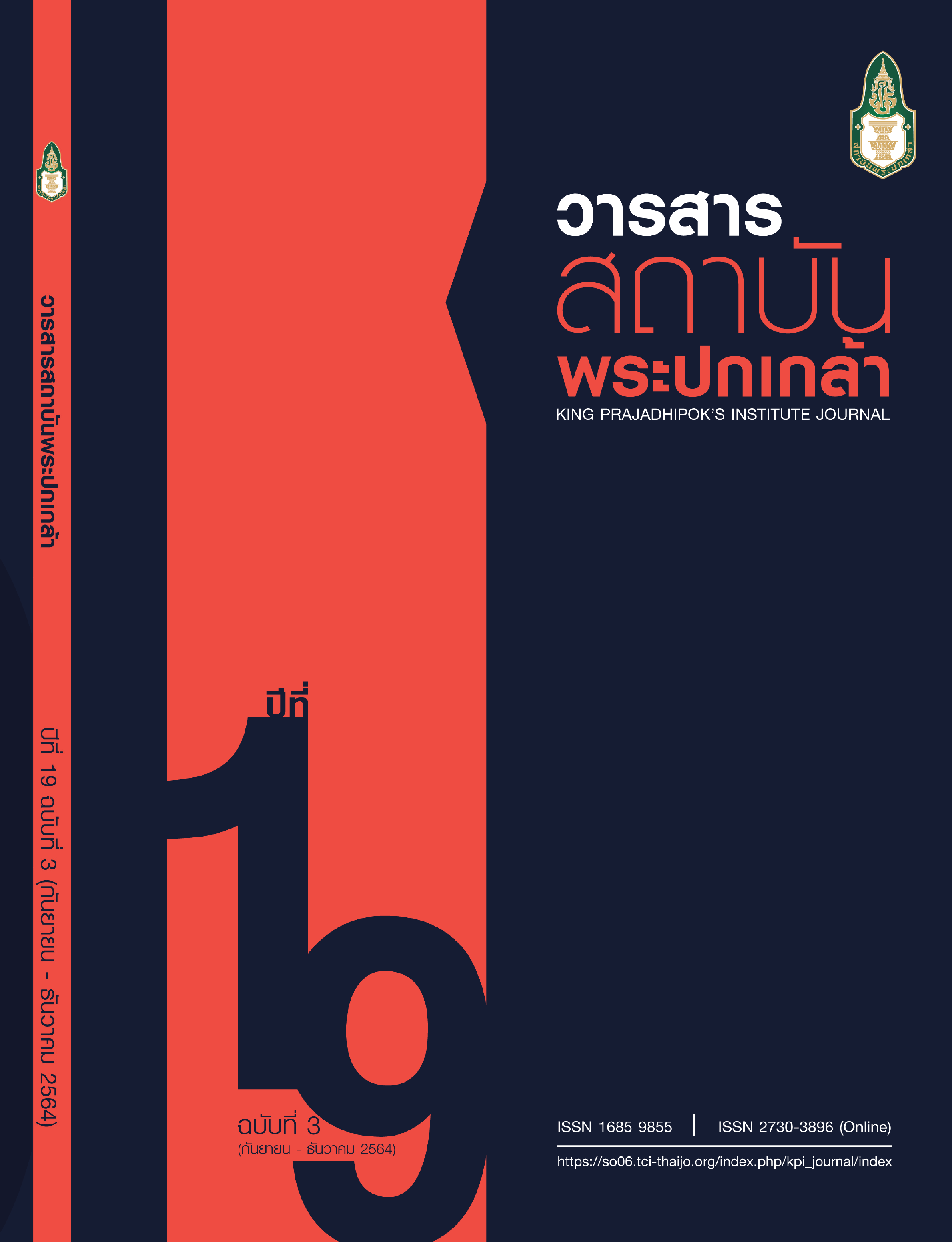Provincial Budgetary Allocation and Inequality in Human Development
Main Article Content
Abstract
Promoting equity and justice is one of the national strategies set out by the government to reduce inequality in the country. However, the way the central government allocates the budgets to the provinces may make it difficult for the government to reach the goals of equity. Inequality of opportunity is a serious social issue existing everywhere in Thailand, even though it may seem to get better slowly. Over the years, we still see spatial inequality of access to high-quality public goods and services. This research aims to analyze the relationship between provincial budgetary allocation and inequality in human development and proposes guidelines for using fiscal policy to promote equality among provinces in Thailand. Using provinces as the unit of analysis, this quantitative research is divided into two parts. First, the researchers utilize several datasets from the Budget Bureau, the National Statistical Office and the Office of the National Economic and Social Development Council to examine the structures and trends of provincial budgetary allocation during the years 2558 to 2562. The results depict that the provincial budget has become more dispersed than it was before, but it is still heavily centralized. Second, employing multiple regression analysis, the researchers find a positive relationship between provincial budgetary and inequality in overall human development (including education and income development). This research provides three main policy recommendations. First, the government should adopt equity-based budgeting. That is, provinces with greater inequality should be given a larger provincial budget to reach the same level of development as others. Second, both local government units and central offices at the sub-national level should develop a budget strategy management framework that will bring all priorities together in one cohesive format that yields much more impactful results. Finally, the provincial budget model should be redesigned to use the Human Achievement Index (HAI) as one of the criteria for the annual budget allocation.
Article Details

This work is licensed under a Creative Commons Attribution-NonCommercial-NoDerivatives 4.0 International License.
@ 2020 King Prajadhipok's Institute The Government Complex Commemorating All Right Reserved.
References
กองทุนเพื่อความเสมอภาคทางการศึกษา. (2559). เจาะลึกบัญชีรายจ่ายด้านการศึกษาไทยและ
ข้อเสนอเชิงนโยบาย. https://www.eef.or.th/wpcontent/uploads/2018/10/PB_EEF.pdf
ดิเรก ปัทมสิริวัฒน์ พิชิต รัชตพิบุลภพ สุวิมล เฮงพัฒนา ภคพร วัฒนดำรง ฐพล สร้อยสมุทร วสุ
สุวรรณวิหค ดารุณี พุ่มแก้ว ภาวิณี สตาร์เจล สมบัติ เหสกุล และ เมรดี อินอ่อน. (2564).
อัตราการเจริญเติบโตของจังหวัดและความเหลื่อมล้ำในประเทศไทย. กรุงเทพฯ: บริษัท พี.เอ. ลีฟวิ่ง จำกัด
ดิเรก ปัทมสิริวัฒน์ ชัยยุทธ ปัญญสวัสดิ์สุทธิ์ และพุดตาน พันธุเณร. (2563). ความเหลื่อมล้ำด้าน
การศึกษา.
https://www.matichon.co.th/columnists/news_2232086
ทิพย์พาพร ตันติสุนทร. (2562). การลดความยากจนและความเหลื่อมล้ำทางการศึกษา.
http://www.fpps.or.th/news-printversion.php?detail=n1606779289.news
ธานี ชัยวัฒน์ พลอยไพลิน ถิ่นกาญจน์และก้องภพ วงศ์แก้ว. (2559). “Inclusive Growth” ทาง
ลดความเหลื่อมล้ำที่เป็นไปได้.
https://tdri.or.th/2016/01/inclusive-growth-new-development-model/
นลิตรา ไทยประเสริฐ. (2554). การลดความเหลื่อมล้ำทางเศรษฐกิจโดยมาตรการทางการคลัง. ในโครงการการปฏิรูปเศรษฐกิจ
เพื่อความเป็นธรรมในสังคม, สถาบันวิจัยเพื่อการพัฒนาประเทศไทย
เนื้อแพร เล็กเฟื่องฟู ศุภนิจ ปิยะพรมดี และ พรพจ ปรปักษ์ขาม. (2563). สามทศวรรษของ ปัญหาความเหลื่อมล้ำไทยและความท้าทายใหม่. https://www.bot.or.th/Thai/ResearchAndPublications/DocLib_/Symposium_2 1Sep2020.pdf
พีรญาณ์ รณภาพ. (2564). ลดความเหลื่อมลํ้านําไทยสู่การเติบโตอย่างยั่งยืน.
https://www.pier.or.th/wpcontent/uploads/2021/03/aBRIDGE
d_2021_006.pdf
พรชนก เทพชาม. (2562). ความเหลื่อมล้ำเชิงพื้นที่และนัยต่อการพัฒนาเศรษฐกิจไทย.
https://www.bot.or.th/Thai/MonetaryPolicy/EconomicConditions/AAA/Inequ
ality_3GiniCoefficient.PDF
พลภัทร บุราคม. (2556). รายจ่ายสาธารณะ ประสิทธิภาพในการจัดสรรและประสบการณ์ ระหว่างประเทศ, สมุทรปราการ: บริษัท
ดี.เค. ปริ้นติ้งเวิลด์ จำกัด
สำนักงบประมาณของรัฐสภา. (2560). การจัดสรรงบประมาณจังหวัดและกลุ่มจังหวัดประจำปี
งบประมาณ พ.ศ. 2560. https://www.parliament.go.th/ewtadmin/ewt/parbudget/ewt_dl_link.php?ni
d=298
สำนักงานพัฒนาเศรษฐกิจและสังคมแห่งชาติ. (2552). ดัชนีความก้าวหน้าของคนประจำปี 2552. กรุงเทพฯ: โรงพิมพ์
บี.ซี.เพลส (บุญชิน)
สำนักงานพัฒนาเศรษฐกิจและสังคมแห่งชาติ. (2557). ดัชนีความก้าวหน้าของคนประจำปี 2557. กรุงเทพฯ: โรงพิมพ์
บี.ซี.เพลส (บุญชิน)
สำนักงานพัฒนาเศรษฐกิจและสังคมแห่งชาติ. (2558). ดัชนีความก้าวหน้าของคนประจำปี 2558. กรุงเทพฯ: โรงพิมพ์ บี.ซี.เพลส
(บุญชิน)
สำนักงานพัฒนาเศรษฐกิจและสังคมแห่งชาติ. (2560). ดัชนีความก้าวหน้าของคนประจำปี 2560. กรุงเทพฯ: โรงพิมพ์ บี.ซี.เพลส
(บุญชิน)
สำนักงานพัฒนาเศรษฐกิจและสังคมแห่งชาติ. (2562). ดัชนีความก้าวหน้าของคนประจำปี 2562. กรุงเทพฯ: โรงพิมพ์ บี.ซี.เพลส
(บุญชิน)
สำนักงานพัฒนาเศรษฐกิจและสังคมแห่งชาติ. (2561). รายงายสถานการณ์ความยากจนและ ความเหลื่อมล้าด้านรายได้ในระดับภาค
ของประเทศไทย. กรุงเทพฯ: โรงพิมพ์ บี.ซี.เพลส (บุญชิน)
สำนักงบประมาณ. (2564). งบประมาณโดยสังเขป ประจำปีงบประมาณ พ.ศ. 2564. กรุงเทพฯ : โรงพิมพ์ หจก. อรุณการพิมพ์
สำนักงบประมาณของรัฐสภา. (2560). รายงานการวิเคราะห์การจัดสรรงบประมาณจังหวัดและ
กลุ่มจังหวัด ประจำปีงบประมาณ พ.ศ. 2560. กรุงเทพฯ.
วัชรพล ว่องนิยมเกษตร. (2557). การกำหนดนโยบายการพัฒนาเพื่อลดความเหลื่อมล้ำเชิงพื้นที่
ของประเทศไทย. วารสารสถาบันพระปกเกล้า. 12 (2), 31-51.
สุพิชชา สุขพวง (2559). ความสัมพันธ์ของการให้บริการสาธารณะกับงบประมาณจังหวัด.
วิทยานิพนธ์ปริญญามหาบัณฑิต, คณะพัฒนาการเศรษฐกิจ, สถาบันบัณฑิตพัฒนบริหารศาสตร์
ภาษาอังกฤษ
United Nations ESCAP. (2018). Inequality in Asia and the Pacific in the era of the 2030 Agenda for Sustainable Development. https://www.unescap.org/sites/default/files/publications/ThemeStudyOnIne quality.pdf
de Mello, L. & M. A. Dutz (eds.) (2012). Promoting inclusive growth: Challenges and policies. OECD Publishing. http://dx.doi.org/10.1787/9789264168305-en


